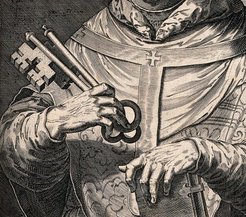Fruitful disputes over biblical texts in the High Middle Ages
Volume 335 of the Studien zur europäischen Rechtsgeschichte out now

At the time of the Investiture Contest, biblical texts were of crucial importance in the dispute between the ecclesiastical and secular powers for the right world order. Nevertheless, the relationship between the Bible and canon law in the High Middle Ages has received little scholarly attention so far. It is now the subject of Philipp Spahn’s dissertation, which was written at the mpilhlt and awarded the 2022 Friedrich Sperl Prize of the Goethe-Universität Frankfurt.
Spahn’s erudite and stimulating study examines the controversy literature produced between 1050 and 1140. The author reassesses the significance of these texts by reading them not as polemical treatises but as early legal literature. In the first part of the volume, he is thus able to demonstrate that contemporary interpretations of the Bible played an important role in the development of methods that contributed to the scientification of canon law and theology, which also affected the hierarchy of norms and authorities.
In the second part of his study, Spahn builds on his findings regarding this important methodo-logical shift in the history of law by analysing the biblical foundations of the relationship between the spiritual and secular powers invoked in the controversy literature. In the dispute regarding the respective positions of pope and emperor in the late 11th and early 12th centuries, the authors arguing for the supremacy of the Church’s authority based their claims primarily on read-ings of the New Testament, whereas the position and inviolability of the secular ruler were legitimised with reference to the anointing of kings in the Old Testament.
Overall, the book shows that the juridification of the Church was intrinsically connected with methodological changes in the handling of both biblical and legal texts in the High Middle Ages.
